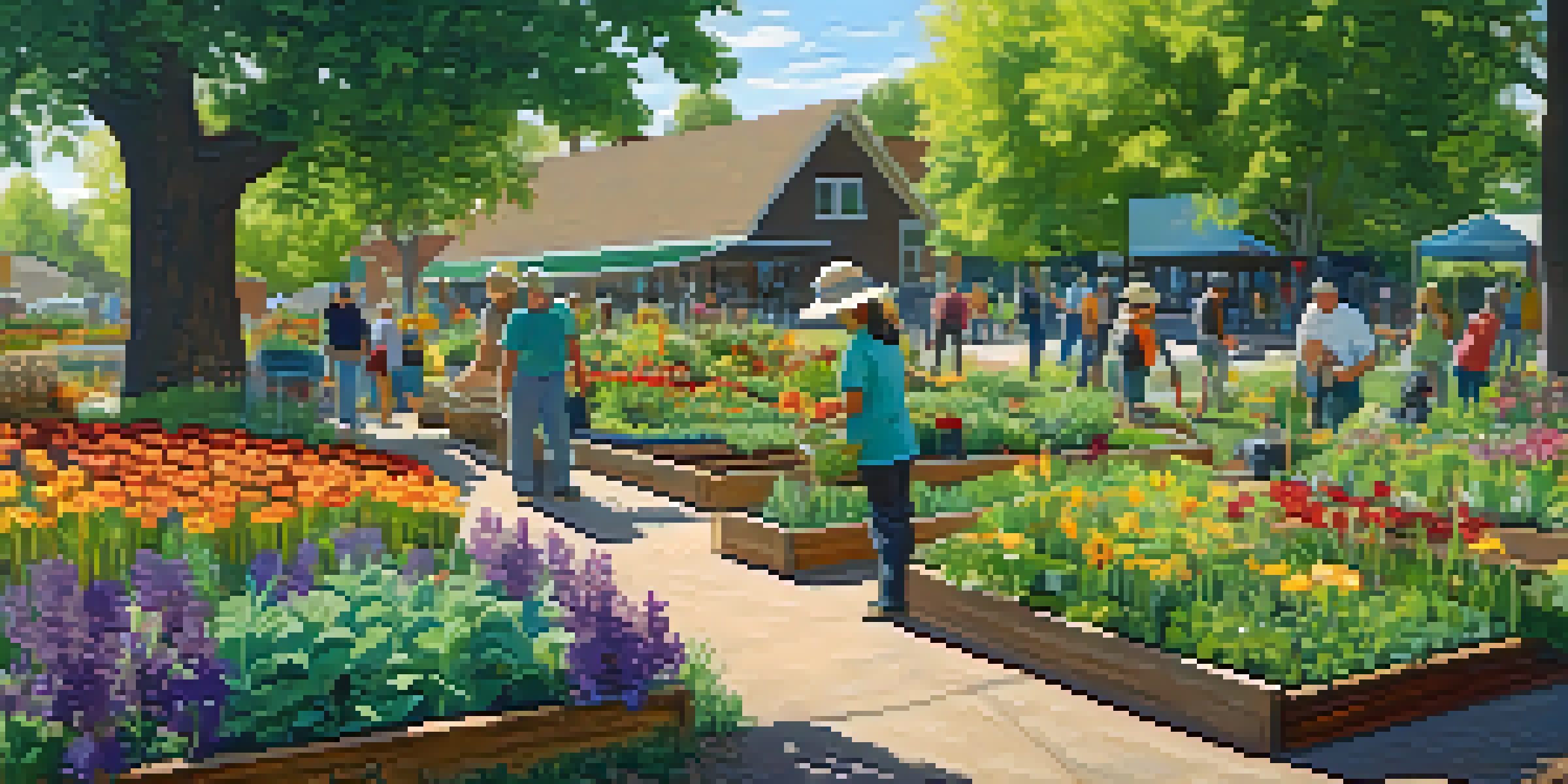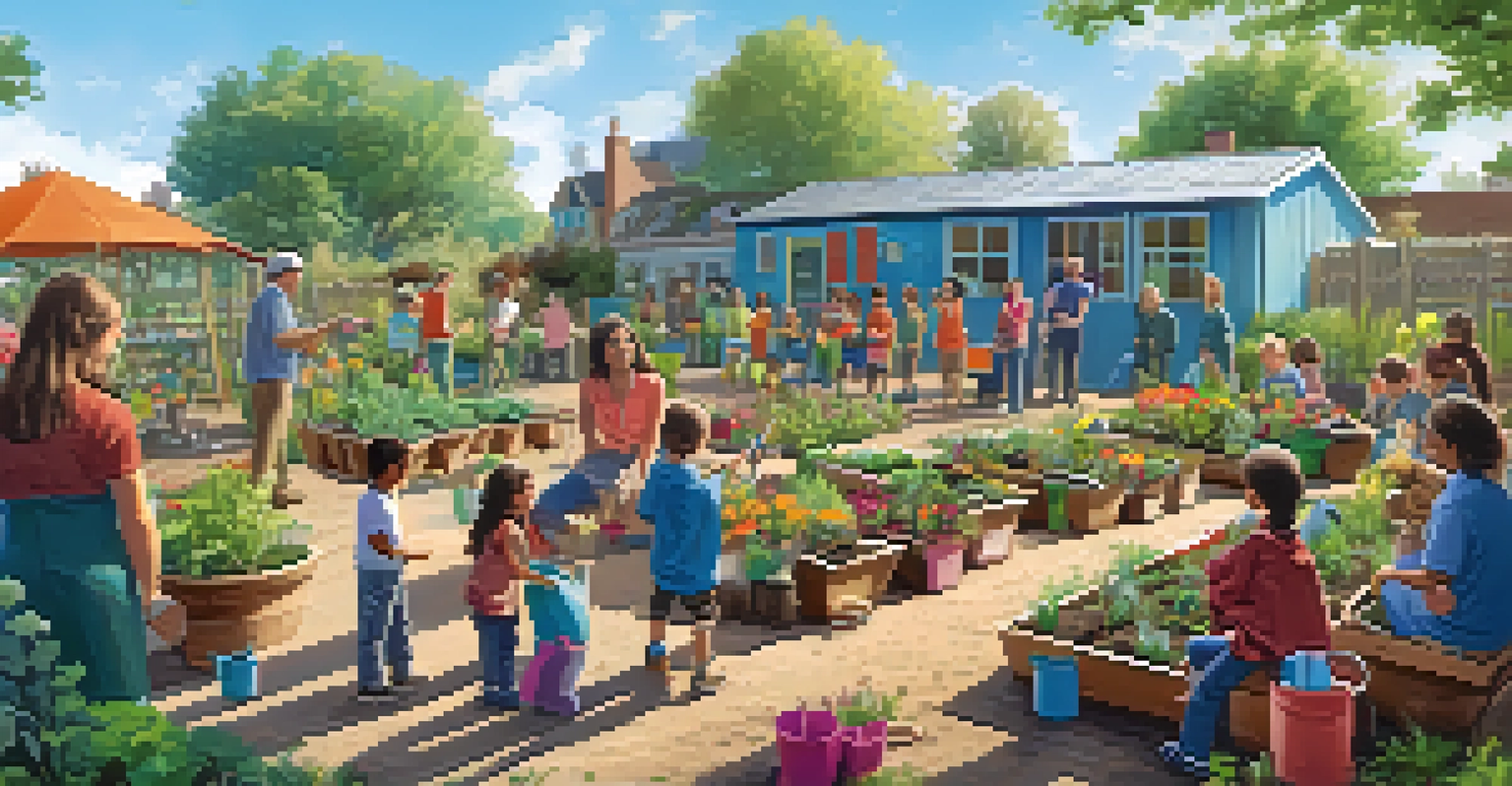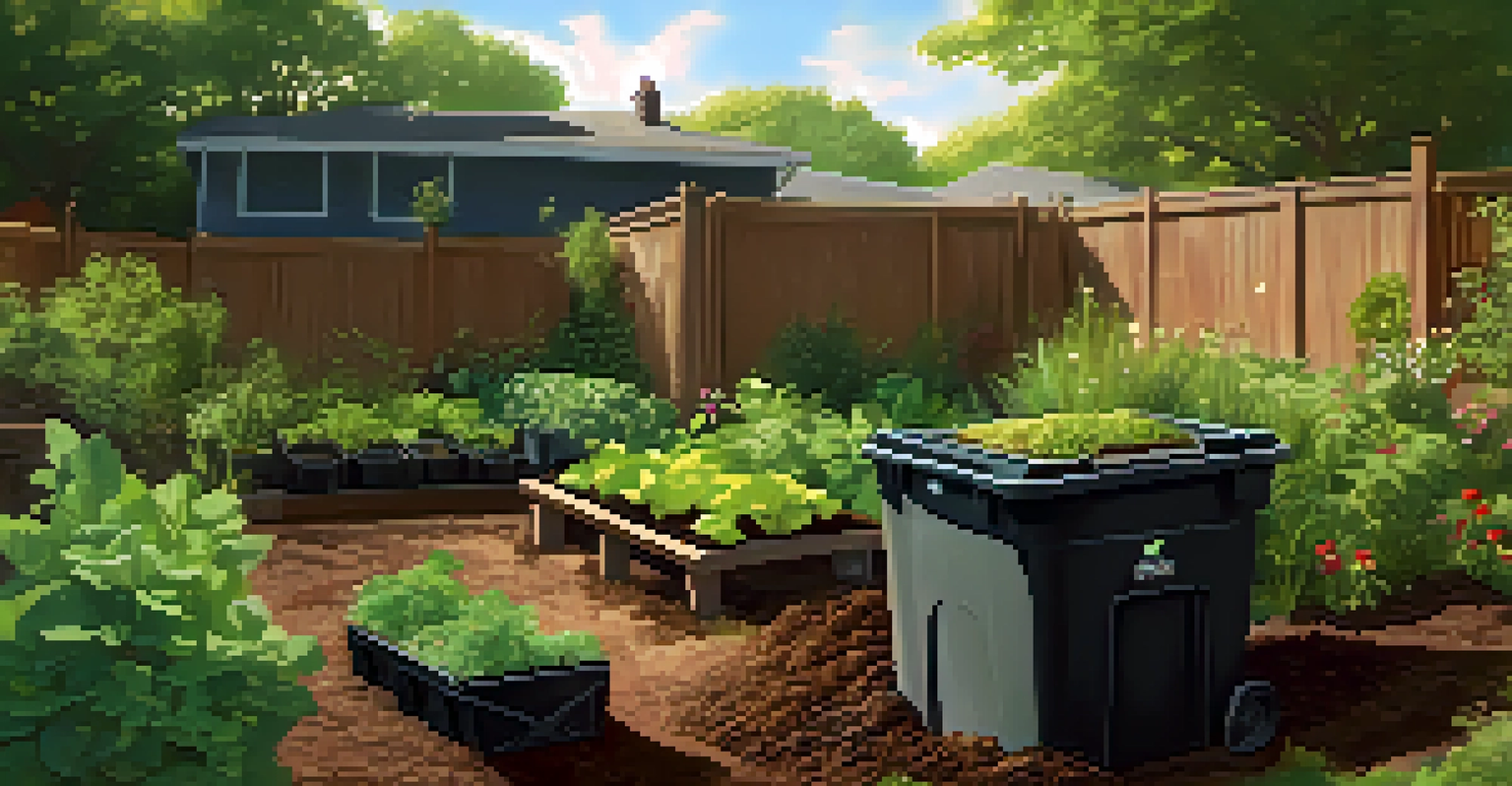Community Gardens: Cultivating Sustainability in Boulder

Understanding Community Gardens and Their Benefits
Community gardens are shared plots of land where individuals can grow fruits, vegetables, and flowers together. They serve not just as green spaces but also as hubs for social interaction and community bonding. In Boulder, these gardens contribute significantly to promoting environmental awareness and sustainability.
Community gardens are not just about growing food; they are about growing relationships, fostering knowledge, and nurturing a sustainable future.
By providing residents with opportunities to cultivate their own food, community gardens help reduce food miles, which is the distance food travels from farm to table. This reduction not only lowers carbon emissions but also encourages a healthier lifestyle as people engage in outdoor activities. Moreover, they offer a chance for individuals to learn about sustainable practices, such as composting and organic gardening.
Additionally, community gardens create a sense of belonging and foster relationships among neighbors. Imagine sharing a bounty of fresh tomatoes with someone who lives just a few doors down or collaborating on a garden project with new friends. This camaraderie can lead to a stronger, more resilient community, one that values sustainability and supports local initiatives.
Boulder's Rich Gardening Community
Boulder is home to a vibrant network of community gardens, each with its own unique character and purpose. Some focus on organic practices, while others may incorporate educational programs for schools and families. This diversity allows residents to choose a garden that aligns with their values and interests.

These gardens offer much more than just a place to grow food; they also host workshops, events, and volunteer opportunities. For instance, many gardens in Boulder run seasonal events that teach participants about native plants, pollinators, and sustainable gardening techniques. This educational aspect not only enriches the gardening experience but also empowers residents to adopt sustainable practices in their own homes.
Community Gardens Foster Connection
These shared spaces not only provide fresh produce but also strengthen community bonds and promote social interaction.
Furthermore, local organizations and city programs often support these gardens, ensuring they thrive. Grants and donations help maintain the infrastructure, while community volunteers dedicate their time to keep the gardens flourishing. This collective effort showcases the strong commitment Boulder has towards sustainability and community engagement.
The Role of Sustainability in Community Gardens
Sustainability is at the heart of community gardens, influencing every aspect from planting to harvesting. These gardens encourage practices such as crop rotation, organic pest control, and water conservation, which are essential for maintaining soil health and biodiversity. Through these methods, gardeners learn to respect the environment and understand the impact of their choices.
The best time to plant a tree was twenty years ago. The second best time is now.
Moreover, community gardens often incorporate composting programs, which help reduce waste and enrich the soil. By recycling kitchen scraps and yard waste, gardeners not only minimize their ecological footprint but also contribute to a thriving garden ecosystem. This process exemplifies how sustainable practices can be seamlessly integrated into everyday life.
The focus on sustainability extends beyond the garden itself, promoting awareness and activism within the broader community. When individuals experience the benefits of sustainable gardening firsthand, they are more likely to advocate for environmentally friendly policies and practices. This ripple effect can lead to significant changes in community attitudes toward sustainability.
Challenges Faced by Community Gardens
While community gardens in Boulder offer numerous benefits, they also face challenges that require collective problem-solving. One of the most pressing issues is securing land access, as urban development can threaten existing green spaces. Gardeners often have to navigate complex regulations or compete with commercial interests, which can create uncertainty for their projects.
Additionally, funding can be a significant hurdle. Many community gardens rely on grants, donations, and volunteer labor to sustain their operations. When resources are limited, maintaining the garden and providing educational programs can become difficult, which may deter participation and limit the garden's impact.
Sustainability is Key to Success
By incorporating sustainable practices, community gardens educate residents on environmental stewardship and contribute to local ecosystems.
Lastly, fostering community engagement is vital yet challenging. Some residents may feel intimidated by gardening or unsure of how to get involved. Therefore, creating inclusive and welcoming environments is essential to encourage participation from diverse demographics and ensure the garden reflects the community it serves.
Success Stories from Boulder’s Community Gardens
Boulder’s community gardens have a wealth of success stories that exemplify the power of collaboration and sustainability. One notable example is the Community Roots Garden, which not only produces fresh produce but also serves as an educational hub for local schools. Children learn about gardening, nutrition, and environmental stewardship, fostering a sense of responsibility towards nature from a young age.
Another inspiring story is that of the East Boulder Community Garden, which has transformed an underutilized space into a flourishing garden filled with diverse crops and flowers. This garden has brought together residents from various backgrounds, creating friendships and a shared sense of purpose. Its success illustrates how community gardening can bridge cultural divides and promote inclusivity.
These stories highlight that community gardens are not just about growing food; they are about growing relationships, fostering knowledge, and nurturing a sustainable future. Their impact resonates well beyond the garden gates, influencing how residents perceive their role in the community and the environment.
Getting Involved: How to Join a Community Garden
If you’re inspired to get your hands dirty and contribute to Boulder’s community gardening movement, getting involved is easier than you might think. Many community gardens welcome new members and often have plots available for individuals or families. Simply visit their websites or social media pages to find out about available spaces and upcoming events.
Participating in a community garden can take many forms beyond just gardening. Volunteer opportunities abound, allowing you to help with maintenance, attend workshops, or even lead educational sessions. This is a great way to meet like-minded people and learn from experienced gardeners, enriching your own gardening journey.
Challenges Require Collective Action
Community gardens face obstacles like land access and funding, necessitating collaborative efforts to maintain and grow these vital green spaces.
Additionally, consider supporting community gardens through donations or by advocating for policies that protect urban green spaces. Even if you don’t have time to garden yourself, spreading the word about the importance of these spaces can create a ripple effect of support and awareness in the community.
The Future of Community Gardens in Boulder
Looking ahead, the future of community gardens in Boulder appears bright, with growing interest in sustainable practices and local food systems. As more residents become aware of the environmental benefits of gardening, we can expect an increase in participation and even more community-driven initiatives. This trend aligns with broader movements advocating for sustainability and food security.
Moreover, the integration of technology in gardening is on the rise, allowing for innovative practices that can enhance productivity and sustainability. Tools like apps for garden management and community networks for sharing resources can help streamline operations and foster collaboration among gardeners.

Ultimately, the continued success of community gardens will depend on community involvement and support. By nurturing these green spaces together, Boulder can cultivate not only beautiful gardens but also a more sustainable and connected community for generations to come.